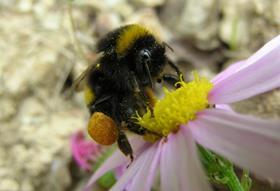
Wild bee pollinators help produce plumper, faster-ripening blueberries, according to scientists.
A unique study led by University of Vermont, USA, revealed that wild bee populations improve the quality of blueberry crops as much as quantity, and led to earlier harvests by two and a half days.
Using electric toothbrushes to mimic the buzz pollination of bumblebees, scientists hand pollinated blueberry plants and then painted the collected pollen on over 5000 blueberry flowers.
They then compared production on these flowers, which received near-perfect pollinated branches to the naturally pollinated branches. The difference between the two conditions revealed each farm’s 'pollination deficit”, the amount by which production could be improved with an increase in wild pollinators.
Of the nine berry farms studied across Vermont, researchers calculated that wild bees could boost production by to to 36 per cent, around $136,000 per year, on a mid-size berry farm.
'Other studies have explored bees' effects on blueberry yields, but this is the first to show that pollinators can improve the quality of crops as well,' said Charles Nicholson, who led the study as a PhD student in UVM's Gund Institute for Environment and Rubenstein School of Environment and Natural Resources.
“This study highlights the undervalued work that wild bees do. Without them farmers need to find pollination somewhere else, by paying high rental fees to bring in honeybees, for example.'
Vermont was an ideal testing ground for their experiment, as honeybees rarely visit the region, making them able to isolate the value of wild bees to berry farmers.
Bumblebees are also more effective at pollinating blueberries than honeybees, having evolved the ability to “buzz pollinate”, vibrating blueberry flowers at a specific frequency to release showers of pollen, something honeybees are unable to do.
'Most pollination research occurs in regions awash in honeybees,' said co-author Taylor Ricketts, director of UVM's Gund Institute for Environment. 'That makes it difficult to really see the job that wild bees can do for farmers.'
'This study shows, yet again, that protecting wild bee populations offers important benefits to our agricultural economy,' adds Ricketts. 'Maintaining healthy ecosystems can be as important as providing fertilizer or water.'



